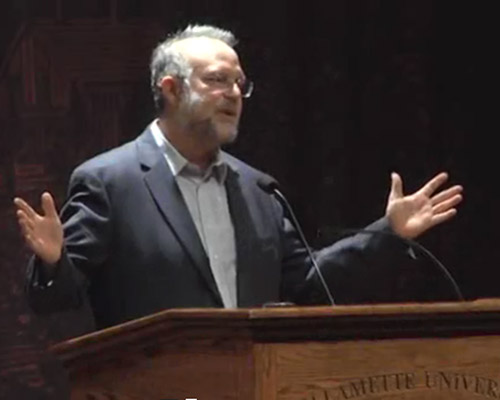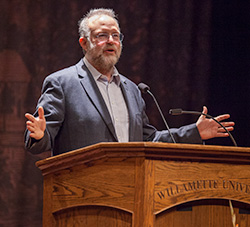When Jerry Greenfield and Ben Cohen started Ben & Jerry’s Ice Cream in 1978, they didn’t have training, investors or a mission statement.
But they did have a goal — to use their business to help the community.
“That’s just who we were,” Greenfield said. “We wanted our business to reflect our own personal values.”
Through Willamette University’s Atkinson Lecture Series, Greenfield shared how this philosophy helped a small storefront evolve into a $300 million ice cream empire.
“There is a spiritual aspect to business,” Greenfield said. “As you give, you receive. We are all interconnected.”
Unconventional Beginnings
A New York native, Greenfield met Cohen at age 13 when they were “two of the slowest, fattest kids in gym class.”
The two grew up together. Then Greenfield earned a degree from Oberlin College, while Cohen enrolled and dropped out of four colleges. When Greenfield graduated and couldn’t get into medical school, he and Cohen joined forces.
“We were essentially failing at everything we tried to do,” Greenfield said. “So we thought, why not get together and try something different? We knew we wanted to do something with food.”
With $12,000 to their name, Greenfield and Cohen transformed an abandoned gas station in Burlington, Vermont into their first ice cream shop. Gradually, the business began to grow, and Ben & Jerry’s Ice Cream was distributed across the country.
But instead of feeling proud of their success, the longtime friends began to question their purpose.
“We felt like our business was becoming just another cog in the economic machine, and we wanted out,” Greenfield said. “That’s when we decided to grow our business in a way that aligned with our values.”
Social Responsibility
Instead of turning to investors, Greenfield and Cohen launched an in-state public offering — giving community members ownership of the company. They created Ben & Jerry’s Foundation, which awarded grants from company profits. And they refused to use any genetically modified ingredients in their products.
“We looked at not just how much money we made but how much we were able to contribute to the communities where we operated,” Greenfield said. “Our actions are based on our deeply held values.”
Impressed by Greenfield’s principles, Zach Oseran MBA ’15, said he’s grateful to the Atkinson Lecture Series, which brings internationally prominent speakers to campus each year to lecture and spend time with Willamette students.
This year, the lecture commemorated the 40th anniversary of the Atkinson Graduate School of Management.
“I really liked the intimate conversation we were able to have,” Oseran said about the classroom experience. “Hearing Jerry’s insight on his journey was very insightful. Our speakers are so relevant.”



